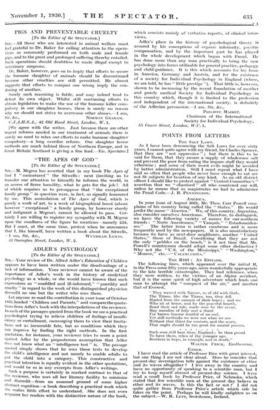POINTS FROM LETTERS
THE SALT LAWS.
As I have been denouncing the Salt Laws for over sixty years, I cannot quite agree with my friend, Sir Charles Spencer, that they are " not oppressive " ; but there is this to be said for them, that they ensure a supply of wholesome salt and prevent the poor from eating the impure stuff they would otherwise ; and some of their worst evils might be avoided by better administration. Still I must repeat what I have said so often that people who never have enough to cat are not fit subjects for taxation of any kind. As an old district officer I should like to protest against " Central Committee's " assertion that we " chastised " all who countered our will, unless he means that as magistrates we had to administer the Penal Code.—J. B. PENNINGTON.
AMERICA.
In your issue of August 30th, Mr. Thos. Carr Powell cony. plains of his country being called the " States." He would prefer the name " America." We, of this country, Argentina, also consider ourselves Americans. Therefore, to distinguish, we have the following variety of names for our northern friends : " Norte Americanos," " Yanquis," " Estadouniden- ses." The latter term is rather cumbrous and is more frequently used by the newspapers. It is also unsatisfactory because we have as next-door neighbours, another " United States," those of Brazil. Considering that they are not the only " pebbles on the beach," is it not time that Mr. Powell's countrymen should adopt some other distinctive ? Why not the "U.S. of the Mississippi," " Washington," "Monroe," etc.—" CALAMUCHITA."
THE R101 : AN EPITAPH.
The following lines, which appeared over the initial ft, in the Press some fifty years ago, seem wonderfully appropriate to the late terrible catastrophe. They had reference, when they were written, to the victims of an Alpine accident, but it is the same spirit of high adventure which leads one man to attempt the "conquest of the air," and another that of Everest.
" They warred with Nature, as of old with Gods. The Titans, like the Titans, too, they fell. Hurled from the summit of their hopes ; and we Who sit at home, and by the peaceful hearth, Read their sad tale, made wise by the event. May moralize of folly and a thirst
For barren honour fruitful of no ond.
Yet still methinks we were not what we are Without that thirst for venture, and the scorn, That ought should be too great for mortal powers.
. . . . . . . .
Such sons still haat thou, England ; be thou proud
To have them, relics of thy younger age.
Brothers in hope, in triumph, and in death."
WALTER CRICK, Eastbourne.
ETHER.
I have read the article of Professor Rice with great interest, but one thing I am not clear about. Does he consider that present-day investigation tells against the existence of ether and its waves altogether ? I live away in the country and have no opportunity of speaking to a scientific man, but I try to keep myself abreast of present-day science. I have
read a small book by Professor Price, of Nebraska, which stated that few scientific men at the present day believe in
elder and its waves. Is this the fact or not ? I did not quite gather from Professor Price's article which side lie takes on the point. Perhaps he will kindly enlighten us on the subject: —W. R. LETT, Scotshouse, Ireland.










































 Previous page
Previous page